World War I - Letters home
The men frequently wrote to their friends and loved ones back home. In the early stages they wrote of their excitement. As the war went on they began to express their dismay at their circumstances.
In the early stages of the war it was not uncommon for soldiers to write with details of where they were and who they were with, especially if they met with friends from civilian life.
Over time censorship was introduced to stop information of this kind getting out of the theatre of war as it was deemed possible to infer troop deployments should the letters be intercepted. Censorship was also deemed necessary to ensure that moral was not affected either at home and on the front line. However, with such large numbers of letters being written, it was at best patchy and many were able to give at least hints of their situations.
The quotations from the letters, which are only a small number of those sent home, were originally printed in Royston’s local newspaper, The Crow. They have been compiled into two volumes by one of the What Royston Did team, Yolanda Hayes, and are available for purchase through Royston and District Local History Society. These pages hold extracts from those books with sections covering the correspondence from each year of the war.
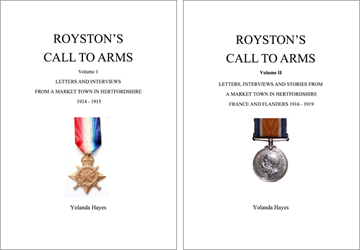
Copyright of these extracts
The extracts from the letters reproduced on this page are taken from "Royston’s Call to Arms - Vols 1 and 2” by Yolanda Hayes. They are copyright and are used by kind permission of the author.
Royston and District Local History Society Publications1914 - Mons and Ypres
August to November 1914
The 1st Battalion of the Bedfordshire Regiment, stationed at Mullingar in Ireland, was ordered to leave for the continent as soon as war had been declared, arriving in France on 16th August as part of the British Expeditionary Force. Within days the men were in action at Mons.
Battle of Mons
Read more about the Battle of Mons by following this link to Wikipedia.
Battle of MonsBattle of Mons and Ypres
Frederick Chales Harridance
Private, 1st Class
Reservist of 18th Queen Mary’s Own Hussars
A past employee of Captain Whitaker’s stables in the town, he had been invalided home where a representative of the Royston Crow went to interview him.
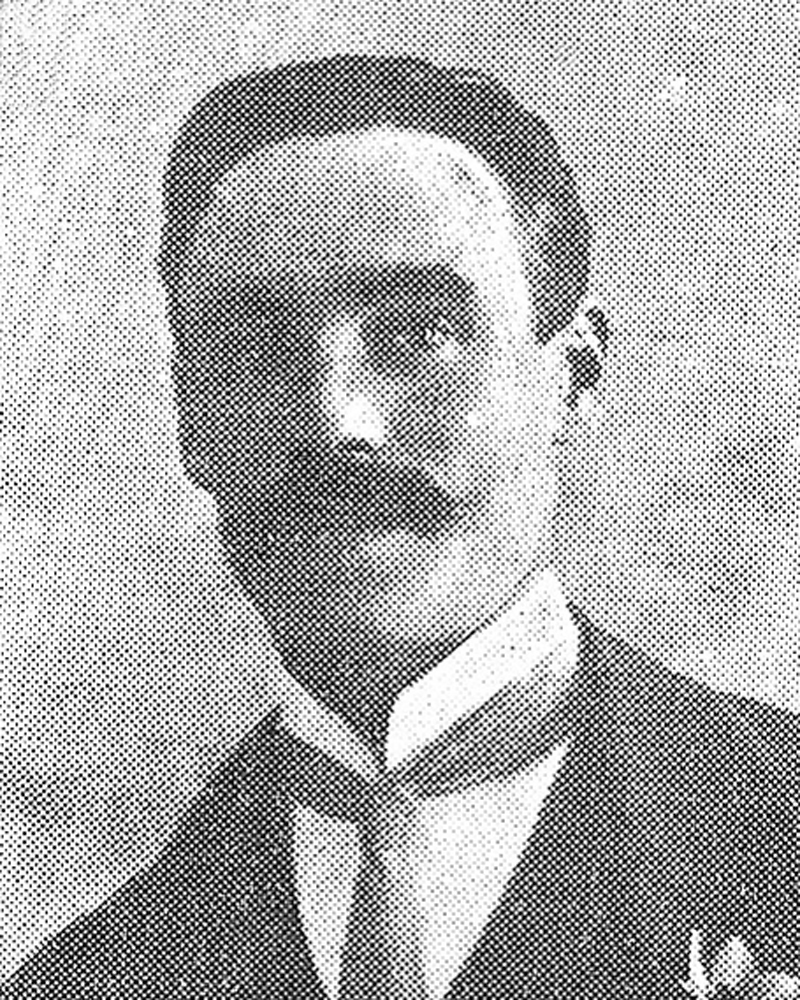
"I left Royston on August 5th for Scarborough, arriving at the Regimental Depot with others, we were served out with kit for active service. All the 1st Class Reservists were then transferred to Tidworth to join the Regiment. We remained there a few days and were visited by Queen Mary and the Princess Mary. After giving us some encouraging words, Queen Mary presented us all with a silver mounted pipe and a quarter of a pound of tobacco.
"Orders to move came on Sunday, August 16th. We had no idea where we were going until we found ourselves in Southampton."
William Alfred Chapman, DCM
Private
2nd Battalion, Grenadier Guards
The son of PC Chapman stationed at Royston police station.
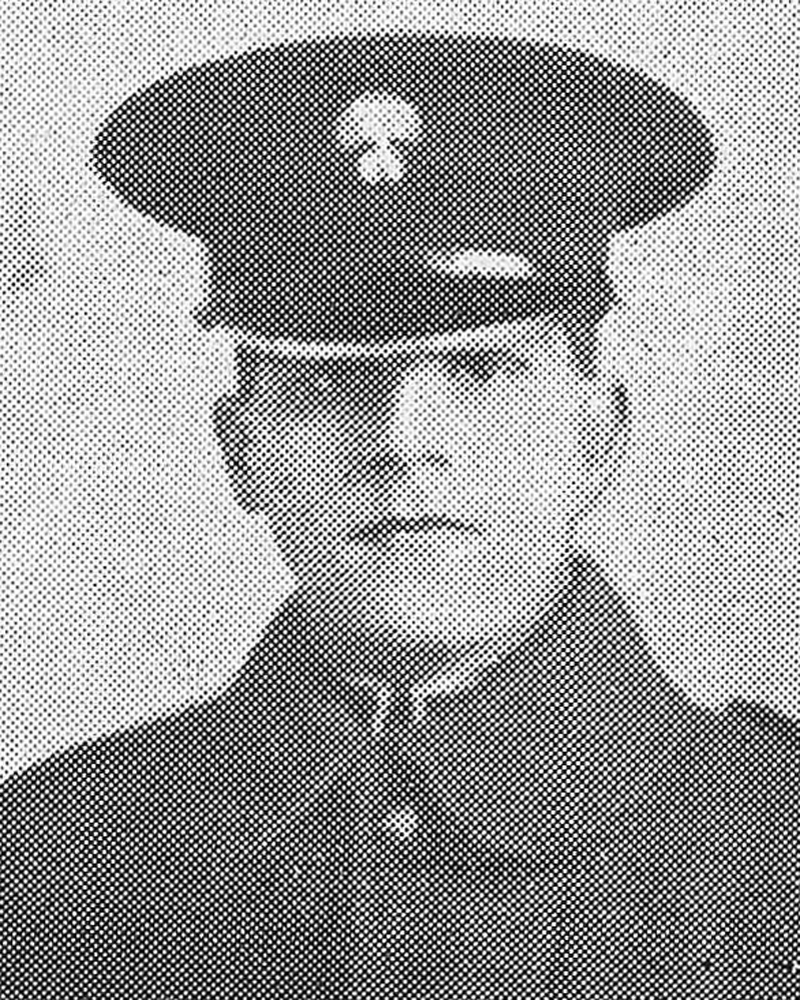
"You ask me to tell you what we live like out here. You will be surprised at the amount of food we get. It is such a lot. We have a quarter of a loaf and a biscuit or two a day, and tea night and morning, fresh meat for diner instead of bully. Of course when we are on the march, we have biscuits and bully, and a dish of tea and that is about all. We get a small piece of bacon for breakfast; you could put a dozen pieces in an envelope…"
Retreat from Mons
Cyril William Wilkin, MM
Royal Engineers, Naval Division, Royal Flying Corps
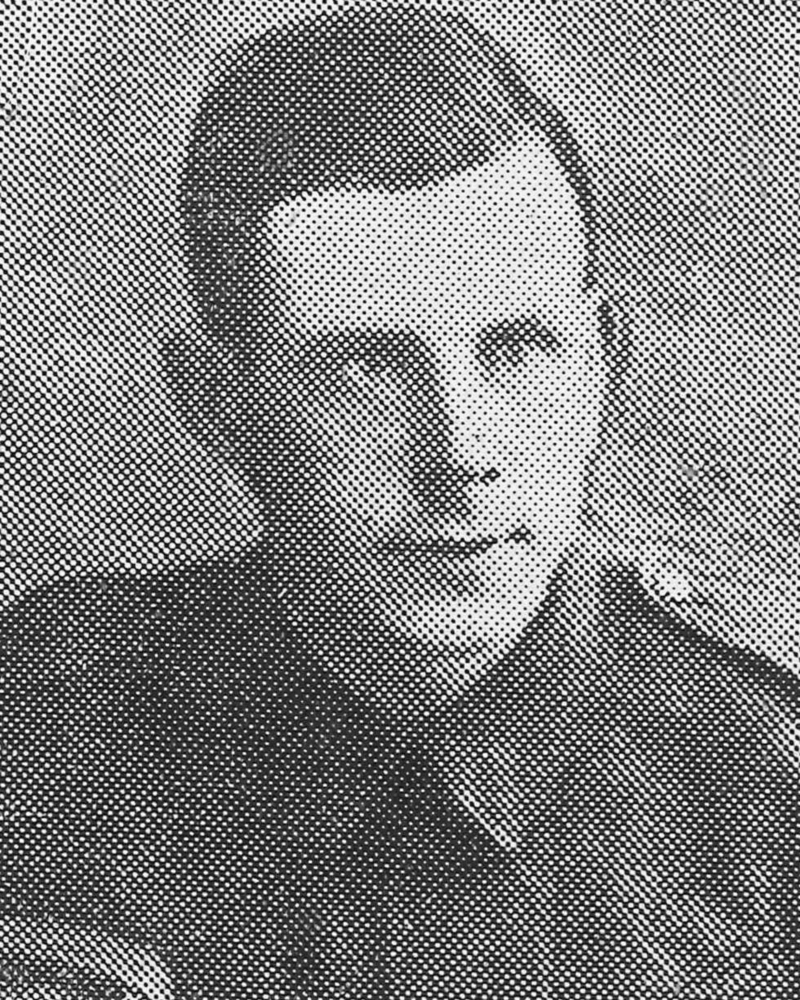
"It was one of the B.E. type machines. We went up about 6000 feet when a stray bullet went through our petrol tank. Of course the petrol run out and eventually the engine stopped. We planed down trying to land in our own lines, and got within about 2000 feet off the ground when the enemy opened fire with their anti-aircraft guns. They hit the tail of our machine which somewhat upset the steering. We made a straight drive down within about 30 feet of the ground and then the sergeant flattened out to land, but just then the whole thing turned over and we both fell out. I landed in a ploughed field and crawled to the road where I was picked up by some of the Army Service Corp men. I was severely bruised and shaken, but had no bones broken. The pilot sergeant came off even better than I did.
"I was taken on to Compiegne and went into hospital. The second night in hospital we were ordered to get down to the railway at once as the Germans were advancing on the town. We entrained and went to Rouen and then to Le Mans."
Christmas in the trenches
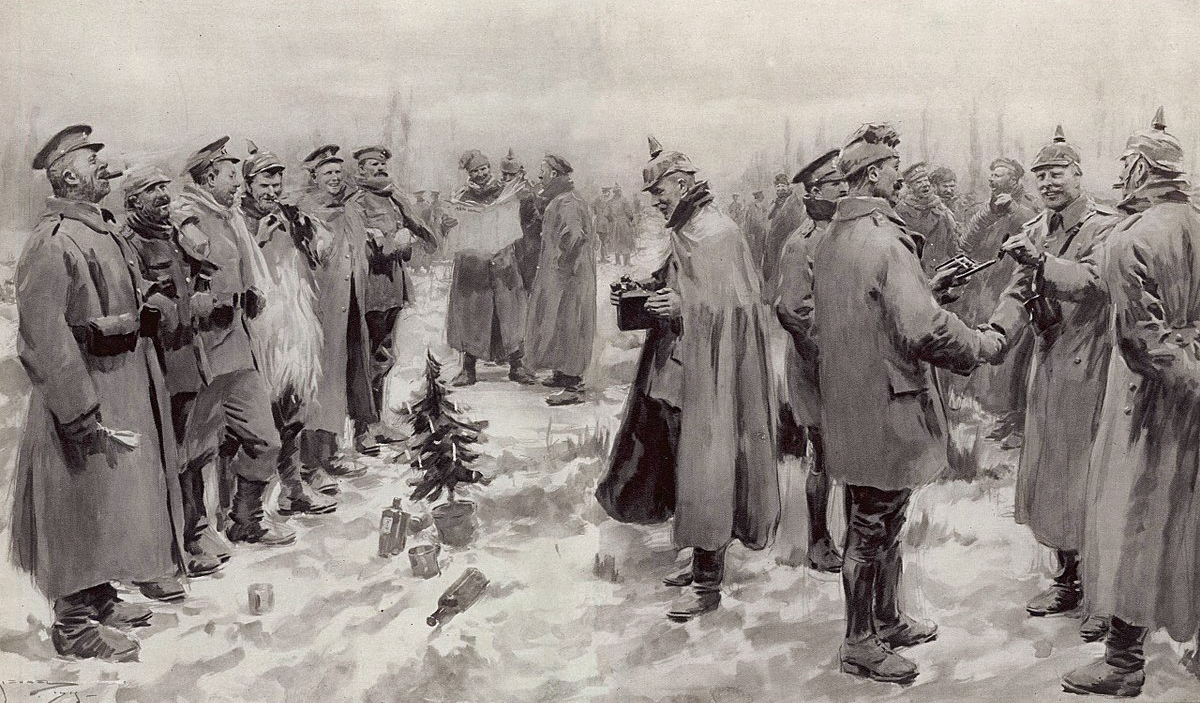
Picture by A. C. Michael - The Guardian
Originally published in The Illustrated London News, January 9, 1915.
Life in the trenches was primitive, and with the arrival of winter rain, the trenches became waterlogged.
In some sections the “No Man’s Land” was just a narrow track, only a few yards from enemy lines.
Therefore, it was no surprise that on Christmas Day some sections engaged in a spontaneous truce, allowing each side to recover their wounded and prepare to for burial of their dead.
Archibad Arnold
Rifleman
4th Division, 1st Battalion, Rifle Brigade
A member of the Royston football team, he had been employed at the Royston brewery.
He was entrenched with his unit at Ploegstreet Wood, about eight miles south east of Ypres.
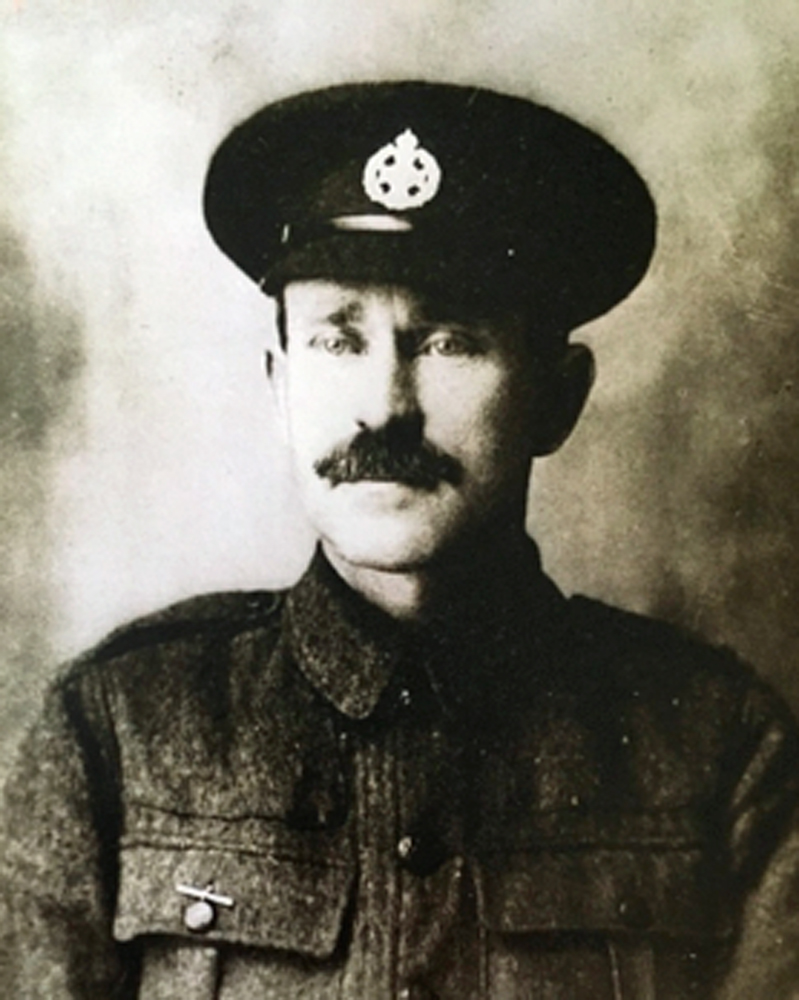
"I may as well tell you what kind of a Christmas we had here. On Christmas Eve the Germans shouted across to us that they would not fire after 12 o’clock if we did not, and I’ll give them their due they kept their word for once. On Christmas Day we met the Germans half-way between the trenches, and they handed us round cigarettes and cigars, and were quite chatty, those who could speak English. Afterwards they buried their dead, and we did the same.
"I will now tell you what I had for Christmas dinner. There were three of us who mess together, we had pheasant and rabbit stew, cabbage and potatoes, plum pudding, mince pies and chocolate. Not so bad for the firing line, was it?"
George Edward Beale
Private
11th Battalion, Bedfordshire Regiment
A resident of Queens Road, Royston. He was wounded in the back in May 1915, spending three weeks recoving before returning to the trenches.
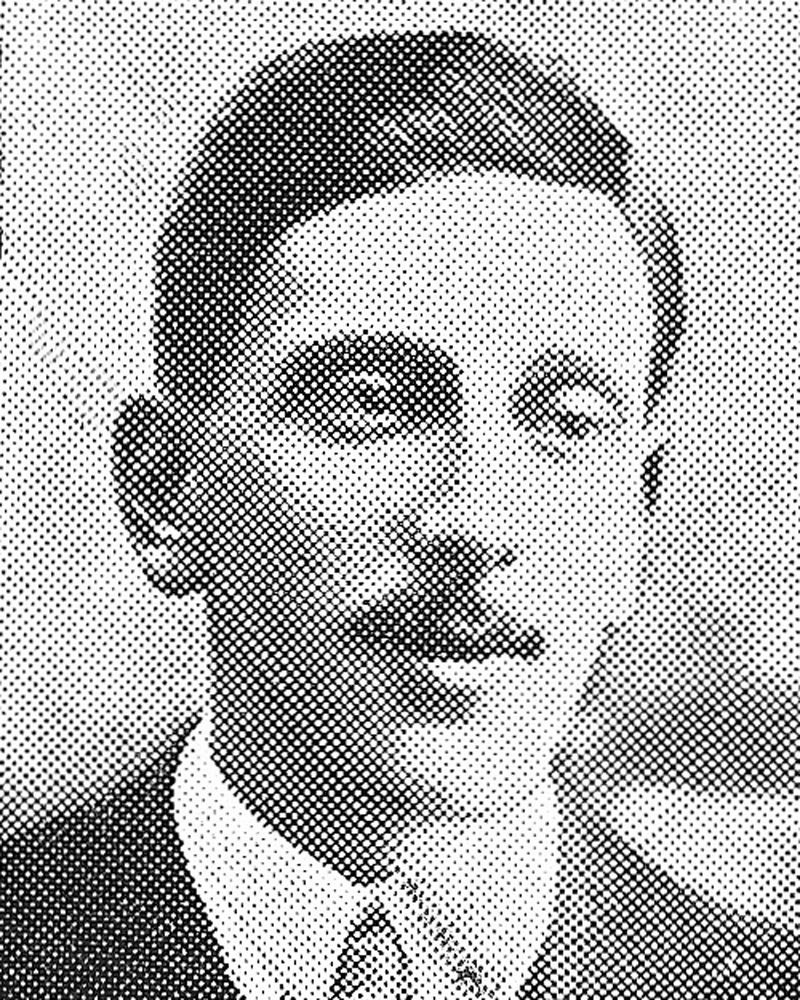
"Our Battalion went into the trenches on Christmas Eve and we came out again last night (2nd January). It has been a bit rough, what with snow and rain, thunder and lighting. We stood up to our knees in water and mud. It took us all our time to get our boots out of the mud after standing still for a minute."
Archibald Wallace Mottram
Private
1st Battalion, Bedfordshire Regiment and 1st Battalion Hertfordshire Regiment
A groom domestic living in Kneesworth Street, Royston. He was at home over Christmas 1915 recovering from a injured knee before returning to the fighting and was wounded in the foot by shrapnell in August 1916.
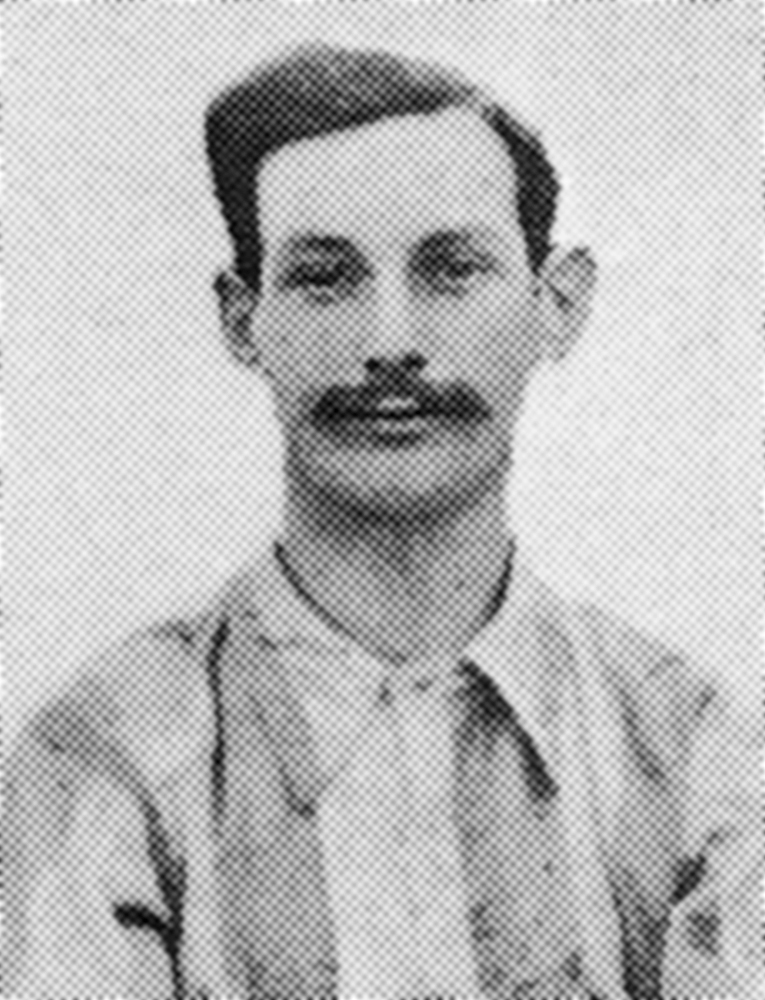
"I am still alive and well. We spent Christmas in the trenches. We were in for three days and came out for 36 hours rest. We go back again tonight. It is a lovely place up here, over your knees in mud and water. It has been raining nearly all the time."
George Holloway
Private
2nd Battalion, Bedfordshire Regiment
Son of Mr. and Mrs. James Holloway of the Warren, Royston.
He was gassed at the Battle of Loos in Sepember 1915 and repatriated. After his recovery he was sent out to Egypt.
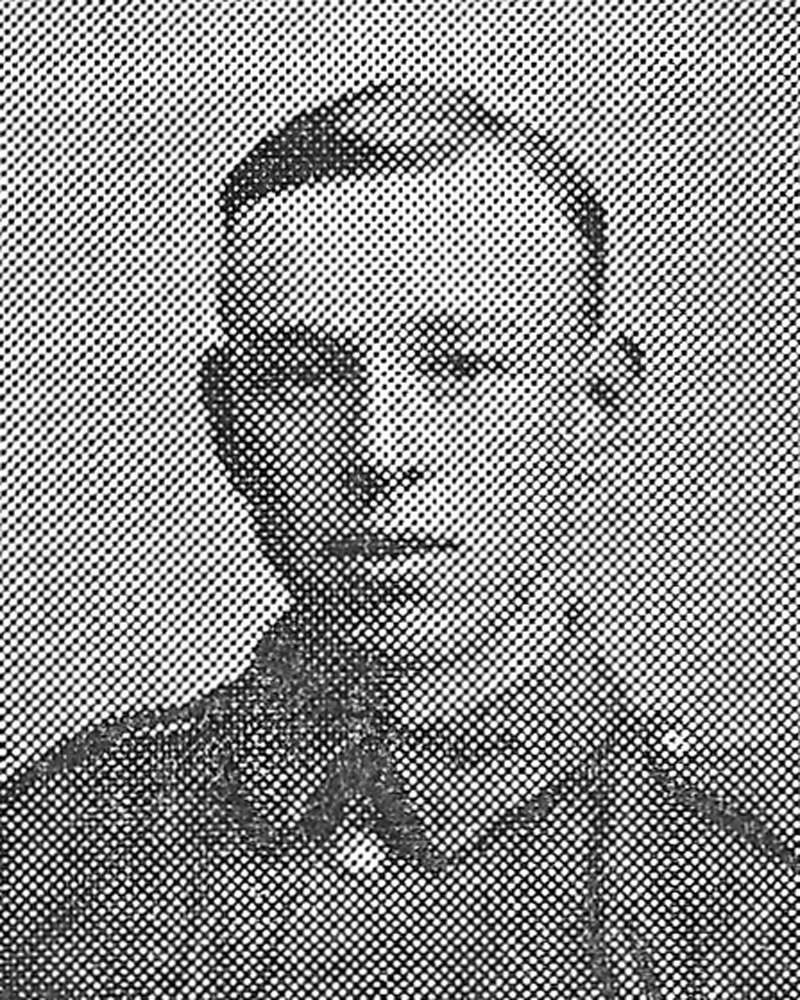
"I must tell you we had a nice Christmas. As we came in to the trenches on Christmas Eve, the Germans shouted across to us and wished us a Merry Christmas. We shouted back ‘the same to you’. Last night it was the coldest we had out here, a sharp frost and bright moonlight. The Germans were singing quite loud. On Christmas Day the Germans told our officers that they would not shoot at us that day if we did not fire at them.
"About 11.30 they called to us ‘you come half way to our trenches and we will come half way to yours’ Two or three of us started first and then some of the Germans came to meet us.
"Later about all of our lot went out to meet them and they shook hands with us and chatted for about half an hour. Some of them could speak English. Some were very young and some middling old. They did look very rough."
1915 - Neuve Chapelle and Gallipoli
10th to 13th March 1915
A detailed attack plan was prepared which would rupture the German lines and allow the Allies to to move towards the Aubers Ridge and Lille.
The element of surprise lead to early success with over 1,500 metres of ground gained and Neuve Chapelle taken. Further advance was then jeopardised when the telephone communication system broke down and the Germans had time to reinforce and dig a new line.
Further attacks were attempted where the original assaults had failed, rather than reinforce successes, eventually leading to a stalemate.
Gallipoli
Read more about the Gallipoli Campaign by following this link to Wikipedia.
The Gallipoli CampaignLife in the dugout at Neuve Chapelle
Harry Negus Hamshaw
Private,
1st Battalion, Cambridgeshire Regiment
A clerk living in Queens Road, Royston.
Easter Sunday, 4th April 1915 was a quiet time at the Front.
"This was the least enjoyable Easter I have ever spent. I was working the telephone in the supports all through the holiday season. I was in a dug out about 200 yards from the fire trenches, and it was wet for the biggest part of the time. Water kept drip, dripping all the time through the roof and down my neck, which was not a very comfortable sensation, but we have to put up with all sorts of things out here and come up smiling every time; you soon forget these little items and make yourself comfy every time you go back for a rest. When we get paid I shall have a good feed of eggs, etc. The rest of the Battalion are in the trenches. We have had a few casualties but I do not think anyone has been killed.
"The worst job is taking rations from the dumping ground, about three miles behind the lead to the trenches. They have to be taken at night and you have to get over ditches, tree stumps, fallen trees etc. and the mud is over your boots all the time, and there are a lot of ‘jack johnson’ holes about and if you get into one of these you will know it, as they are mostly about four feet deep and full of mud and water. Of course this work has to be done, horses cannot get where men can, and you cannot take with you enough tommy and chaw to last you eight days when you go up. I am pleased to say I am feeling fit and well and ready to have another smack at the Allemand when wanted."
William George Worland
Private
“D” Company, Devonshire Regiment
He embarked for France in November 1914.
By December he was entrenched at a place known to the soldiers as the Moated Grange, near the town of Neuve Chapelle.
On 10th March he received orders to attack the German lines and, by the end of this battle, his regiment had lost 284 men.
This letter to his parents in Royston, dated 27th March, was published in the Royston Crow on 9th April.
"We go into all those battles and have not the slightest idea of what is being done. As soon as we begin a battle we think about nothing else. You seem to go mad, don’t care a hang what you do or where you go. When we are told to climb over the parapet of our trenches and charge the enemy we find bullets and shells flying round our ears and we absolutely forget everything else but the enemy in front. You may get a chance to rest for a while, and then your senses return and loom around and the sight is awful and heartrending.
"At the last battle (Neuve Chapelle) the Germans came on in full marching order, four deep. We could see them advancing in masses and our artillery and rifle fire mowing them down, but on they came. They fired like blazes on us as we advanced across the open, but as soon as we reached their trenches they flung down their rifles and put up their hands.
"They won’t fight face to face. As soon as they see our bayonets they shake like leaves before the wind, and all they can say is “comrade”. It is a hard job to show mercy to to such fellows as these, they play dirty tricks, For instance, in one of the trenches we took from them, a German officer lay supposedly dead. Presently there came one of our officers down the trench with some men. The German who was supposed to be dead turned around and fired point blank at our officer and killed him dead. One of our fellows lit a bomb and blew that German to bits.
"If I prayed to God once in the last battle I prayed to Him a hundred times, and there were a good many others who did the same. He answered our prayers and brought us through unscathed."
The Gallipoli Campaign
W. J. Cope
Sergeant
1st / 4th Cheshire Regiment
"Our regiment was in the new landing at Suvla Bay. I landed with my platoon 60 strong on Sunday, August 8th and on the 12th I had only 7 men left including myself and Sgt Pierce. We were in the trenches from the night of August 12th to September 4th and during those 20 days I do not believe one of us had a wash. After being under fire continually for eighteen weeks I can assure you we were glad to get away. On November 25th it rained so long and fast that in some places our trenches were four feet deep in water, and in others it ran over the six feet high parapets. Just near us men were actually drowned in their trenches. After the rain we had a snow blizzard, a few men were frozen to death, and a thousand or more were taken out suffering from frost bite."
Robert (Bob) Charles Sermons
Sapper
Signallers Company, Hertfordshire Regiment
Bob was with Dick Brosberry, a Private with the Royal Army Medical Corps at Gallipoli with their units.
"There are a good many who already know that Private Dick Brosberry and myself left England at the latter part of July last year (1915) and I believe we have accomplished what we are dearly proud of and that is that we two Royston boys stuck the divisions whole period on the Peninsula without going to hospital and also the period since in Egypt. We were there at the night of the landing and the following day with full kit and two horses. I went ashore in the flat bottomed lighters. We were shelled terribly but we managed to reach land and to get our horses picketed down in some hollow close to Brigade headquarters.
"The following day whilst feeding one of my horses shrapnel came over and caught one of the animals, which had to be destroyed and buried at once in the boiling sun. A week later we were shifted from Suvla Bay round to Lala Baba and had to march across the Salt Lake at midnight. My friend was shifted to Anzac I believe straight away and we followed 24 hours later. We took over a good position but very dangerous and joined hands with the Australians. The last few weeks the weather has been such that I hope never to experience again, and with hardly a shirt on my back and not a single button on my coat, two toes showing out of one of my boots which I had frozen, we stuck it until it was our lot to be taken to a quiet and respectable land. The gullies were hip deep with sludge and muck, through which we had to fetch our rations. Once per week we thought ourselves lucky if we saw a piece of bread and then when it did appear it worked out at about 8 men per loaf."
Andrew Pickstock
Lance Corporal
“B” Company, Yorkshire Regiment
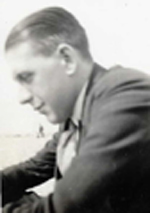
"All our chaps are deeply grateful to the people of Royston for the way they have treated us by sending these kind parcels and I notice a constant stream of letters seem to come. I think we can say that Royston is our second home. I can honestly say I never had a more comfortable billet since I left home than I had at Mrs Brown’s, High Street, Royston. It was was like leaving home when I had to come away."
Charles Roberts
Private
Cheshire Regiment
"It was on the Sunday afternoon of August 8th when we landed. Shelling was in progress all the time, but fortunately none came our way. After a few hours rest we went up into the firing line very early on the following morning and as we started from the shore our advance was met with a fusillade of shot and shell. By dint of a great effort we pushed forward and established ourselves on higher ground, only to be pestered with enemy snipers. And then it all happened!"
Sargeant Robinson
“C” Company, 1st / 4th Cheshire Regiment
"We left Bedford on July 17th and went straight to the Dardanelles, and went straight into action. I have often wondered since what madness makes one want to go to the Front, because when you do get there it is nothing but hell let loose, it is really.
"The 4th have by no means disgraced themselves, but many a poor chap will never come home again, including Private Robert Gorman, who married a Royston girl (Ellen Dorothy Sell, of Morton Street, 9th May). He died a hero’s death, carrying a wounded man to the dressing station but the swine put a bullet through him, even though he was carrying a stretcher."
1916 - The Somme Offensive
The Somme
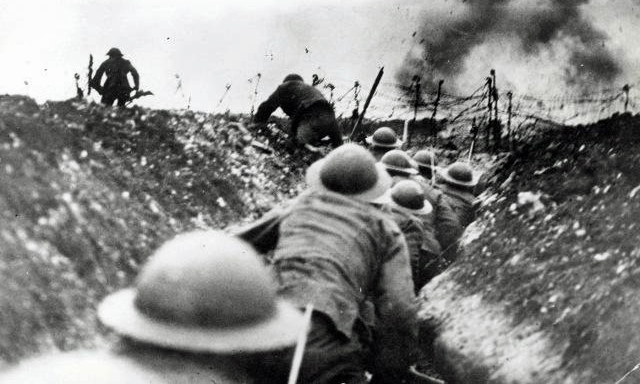
The offensive on the banks of the River Somme in France was to have been a combined effort by the French and the British as part of a coordinated attack on the Germans, including the Russian and the Italian fronts.
The plan was disrupted when the German army attacked the French at Verdun in February 1916 and a large part of the French army was diverted to deal with this threat leaving the British to provide the principal allied effort.
What followed was a series of battles of attrition which took place from 1st July to 18th November 1916. On the first day the British alone lost 57,470 men.
The fighting ceased on 18th November as the weather conditions made any further conflict impossible. By this time the casualties on both sides numbered between 1.1 and 1.3 million men.
The ferocity of the fighting at this point in the war meant that a large proportion of the communications from the front lines to those at home were from those commanding the men, informing families that their loved ones had been wounded or killed. Some of the men did continue to write home when they could and the ability to do so continued to boost moral in the trenches.
Although still subject to censorship for any information which was deemed helpful to the enemy, such as locations, numbers of troops deployed and even the weather conditions (which may give information on trench conditions) a considerable leeway was given for men to tell their stories.
Battle of the Somme
Read more about the Somme Offensive by following this link to Wikipedia.
Battle of the SommeJuly 1916
Unknown soldier from Litlington
Location unknown
"On Monday (10th July) at 3.20am we went into action, our objective being a certain wood which was said to be held by only a few German snipers. We were the first line of the attacking force, and advanced under heavy shell fire right up to the wood, where we received a terrific rifle and machine gun fire. We pushed on however and took the bigger part of the wood but the Germans were in strong force and occupied very strong positions, and we were compelled to withdraw from a part of it after a severe struggle and then for two days and nights a beautiful scrap was carried on, and we were shelled, bombed and attacked by infantry but we managed to cling to our bit of the wood until we were relieved by another regiment. It was a very hot time, one of the hottest the battalion had been in."
August 1916
Harry Mottram
Private
Machine Gun Corps
A month into the Somme Offensive the 1st Battalion, Bedfordshire Regiment had been stationed at Pommiers Redoubt, near Memetz.
In this letter, dated 5th August he tells of tragedy and of meeting friends.
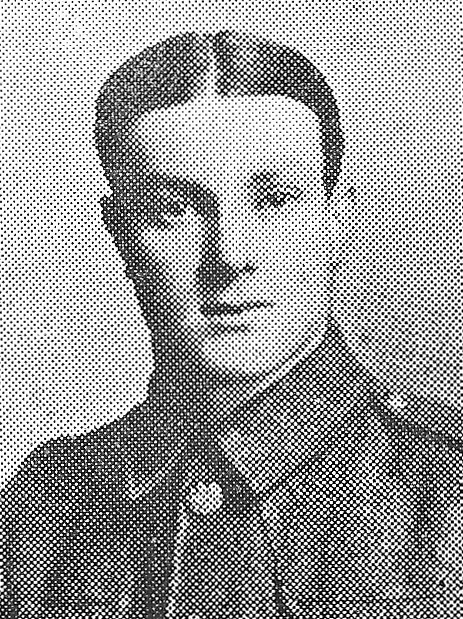
"We came out of the trenches last night for a few day’s rest. We had our 1st Gunner killed by a shell on Wednesday. He was standing outside the dugout and we were inside when a shell burst. He only lived half an hour; we also had a sergeant killed last night. They were the only two we lost.
"I wrote to Frank on Wednesday and in the afternoon I heard that the Hertfordshires had just relieved the Sussex on our right, As soon as I was off duty, I went along the lines to the Hertford position and found Reg Smith, Harry and Bill Howard, but Frank was on duty.
"On Thursday morning George Woods came up to see me, and ten minutes later Frank came strolling up. You can guess what we felt to be together for an hour, and we had one or two things over. He looks well."
September 1916
George Henry Thomas, MM
Private
Army Service Corps; Royal Tank Corps; “D” Battalion, Machine Gun Corps (Heavy Branch)
Well known by his nickname “Boots”. He married Minnie Poulter and had two children by the start of the war.
He was called up in 1916 and enlisted in Hitchin.
On 11th September he was injured in action and, for his bravery, was awarded the Military Medal.
In this letter to his wife from a convalescent camp in France he explains why he was reluctant to tell her he was now “with the tanks”.
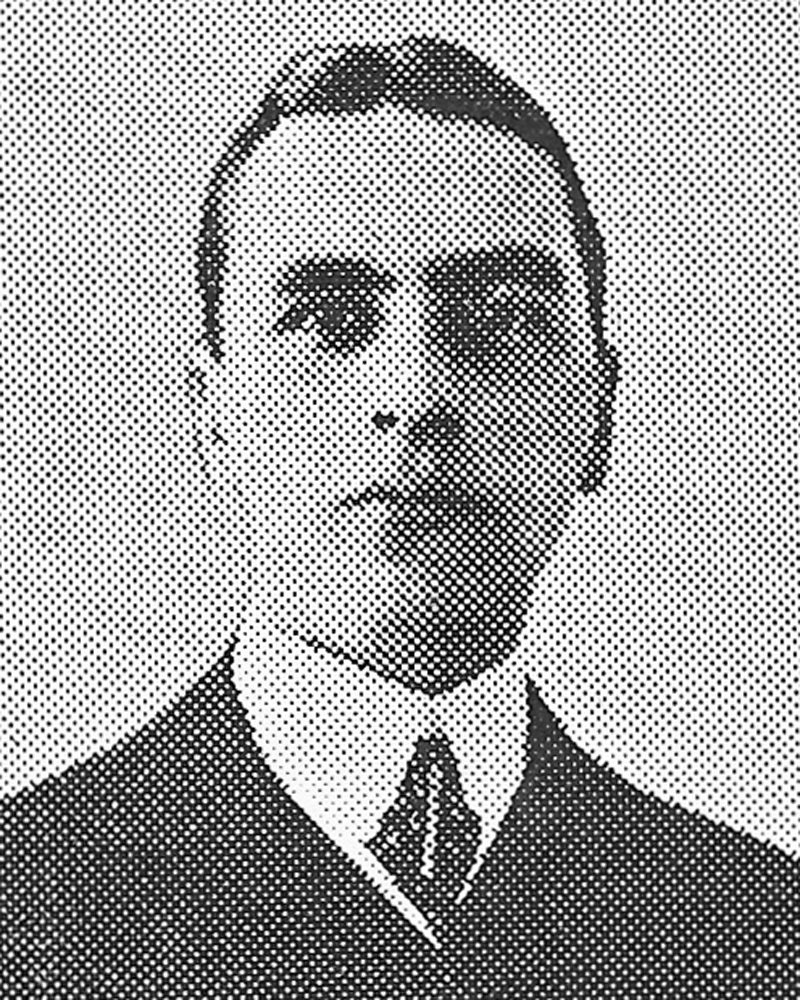
"I did not tell you when I wrote last that I was on a “Tank” because I knew you would worry. We went in on a Thursday night at 10 o’clock and we reached our objective about 11 o’clock on Friday morning. We did all they wanted us to do, and had just reached our last point when we caught a shell, a 9.2, one of the biggest. I got a few shell splinters in my nose and forehead, but not enough to bring me to England.
"It is quite all right for us now we have made a name for ourselves. Talk about shell fire, it was awful. I had to come back three miles through it. It was a wonder I was not put out ever so many times. It was however, my luck, and nothing else, that got me through.
"We went over the first, second and third lines, and through a village before we were stopped. It was hard luck, as we got them on the run, not half! You ought to see them, and I think we shall keep at them now."
1917 - Arras and Passchendaele
Ypres ans Passcendaele Offensives
Learn more about the objectives and outcomes of the battles which took so many lives in 1917 by following this link to Wikipedia.
Ypres and PasscendaeleMay 1017 - Battle of Arras
Many men at the front welcomed connections with home. In the following letters we read of the things that brought thoughts of home to those involved with the fighting.
Charles Bird
Driver
British Red Cross
"It was nice to read of the doings of Royston in the Herts and Cambs Reporter, which my wife has sent to me every week since I have been out here. I hope to visit Royston once again before many months are over.
"I saw Percy King and Mr. Gamble’s son [Alfred Gamble] two weeks ago. They are quite well."
William Ernest Marriott
Private
Dorset Regiment
Lived in Garden Lane, Royston. He was sent to France in January 1917.
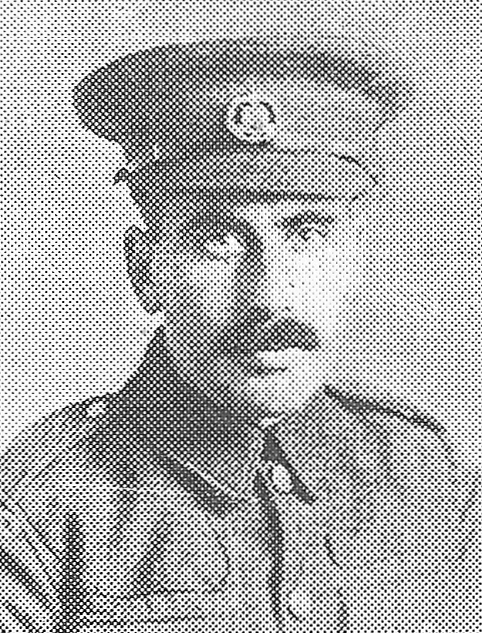
"We were soon in the firing line, afterwards taking part in the open fighting in the capture of villages, etc. I have escaped with only a slight scratch, the bullet striking my rifle and taking a small piece out of my thumb which has now healed.
"One thing that interested me in the marching through France was that some of the crows on the land were black and white, similar to those I have seen stuffed in Royston."
Unknown Roystonian
Royal Army Medical Corps
"I ran across a fellow yesterday who was one of the Royal Welsh Fusiliers when they were in Royston in the early part of 1915. His name was Parry I think and he was billeted at W.C. Titchmarsh & Co’s, High Street and he told me what a good time they had there and how good the people of Royston were.
"I have come across lots of people I know and it is just great to meet and have a good chat about old times."
July to November 1917 - Passchendeale
Sidney George Andrews
Lance Corporal
Hertfordshire Regiment
The letter here is all too commonplace an event following engagements during the Passchendaele offensive.
It was written to his wife by his commanding officer.
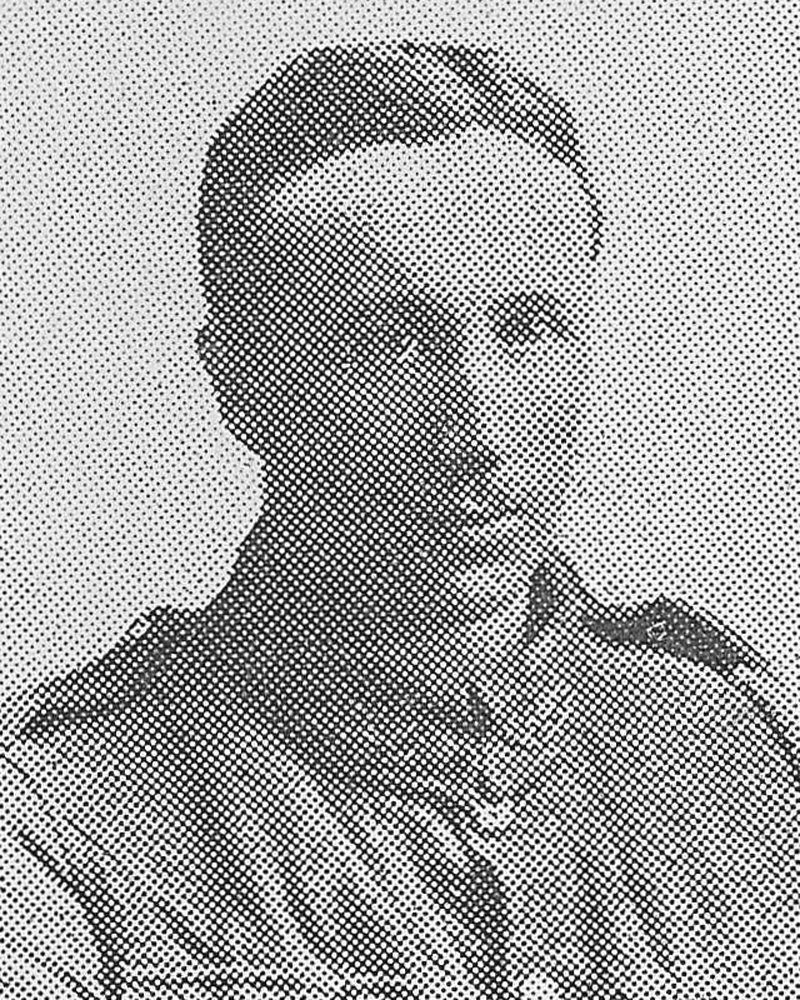
"I am writing to offer you my deepest sympathy in the very great loss you have sustained. I am sorry to have to say that your husband was killed on August 2nd, while taking a ration party up to the trenches. He was buried here by our Chaplain and cross erected over his grave.
"He had been with the Regiment since we came to France and his loss is a very great one to us. He was a splendid soldier and was very popular with everyone, and knowing him, I know what his loss must mean to you."
Wrenford Rayment
Gunner
1st Battalion, Cambridgeshire Regiment
It is not always easy to see the better side of things when in the midst of war but in this letter Gunner Rayment shows that some, at least, saw how fortunate they were, even though injured, when compared to others who had lost their lives.
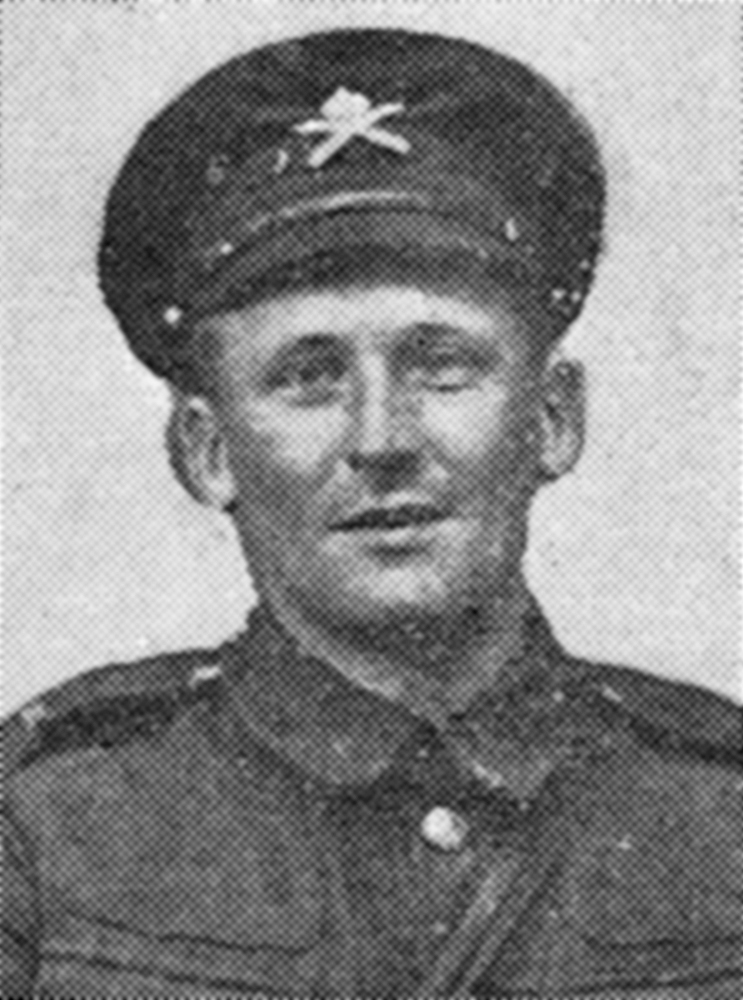
“Just a few lines to let you know I am getting on all right. Just beginning to feel myself again. I had a nasty shake, and you only have to thank God you will have the pleasure of seeing me again, for He has heard your prayers and my own.
"A shell burst just by the side of my foot. We lost several, I am sorry to say, so I am more lucky than they, for after all life is sweet, and I may be able to get about well when I am set up."
Jack Halsted
Gunner
“B” Battery, Royal Field Artillery
Throughout his involvement in the war Gunner Jack Halstead kept a diary. It provides a remarkable insight into how one man saw the fighting, the events he witnessed and the thoughts that these provoked in him.
In these two entries we see the war from two perspectives. In the first is the horror at the desolation he saw when they reached the Ypres Salient.
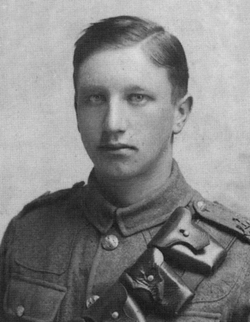
"A small semi-circular district whose diameter was eight miles of canal that ran through Ypres and whose circumference was the line of trenches from Pilkem, out to Hooge, three miles east of Ypres, and down to St. Eloi. Three main rodes branched out in the salient, roads of death. Ghastly sights were to be seen at every turn.
"These roads, Menin Way, Zillebeke and St. Jean. From these roads ran by-roads. Perhaps they did not exist in pre-war days. The points at which these by-roads joined the main roads, were well registered by the enemy. Day and night they were shelled. Renewed corners were “Salvation Corner”, “Hellfire Corner”, “Oxford Circus” and “Iron Cross Corner".
"To walk along these roads at dawn - what ghastly sights. Men and horses which had been killed, and run over a thousand times by the heavy traffic."
The second entry describes the days over Christmas 1917 which provided some relief from the fighting.
"Christmas Day. Never fired all day. The Germans never reacted, biscuits and bully for dinner. Whisky we had from the Major. Two tins of cigarettes from Holloway Guard. At night blizzard. Spent night in signallers pit and three infantry machine gunners who were attached to us.
"26th December. On this day we had our Christmas day. We were relieved to go down to the wagon line. Jack Inman came up to take over from Parkingson. First time we had seen him since gassed at Ypres. Nice day but walking bad with the snow. Needless to say we stopped to have one at every canteen. After nine miles we arrived at Bertincourt - as much beer as we wanted - good dinner. Roast beef and plum pudding - well. Afternoon, visit to B.E.F. Canteen and to pals in ‘A’ and ‘C’ battery. Barn at night - went well prepared with a petrol can of beer and rum. We were supposed to have walked that nine miles back to the line. We were seeing that we could do it or not. German planes bombed the village. Under the circumstances it troubled us but little. Slept well.
"It was a good Christmas."
1918 - Spring Offensive and Armistice
The German Spring Offensive
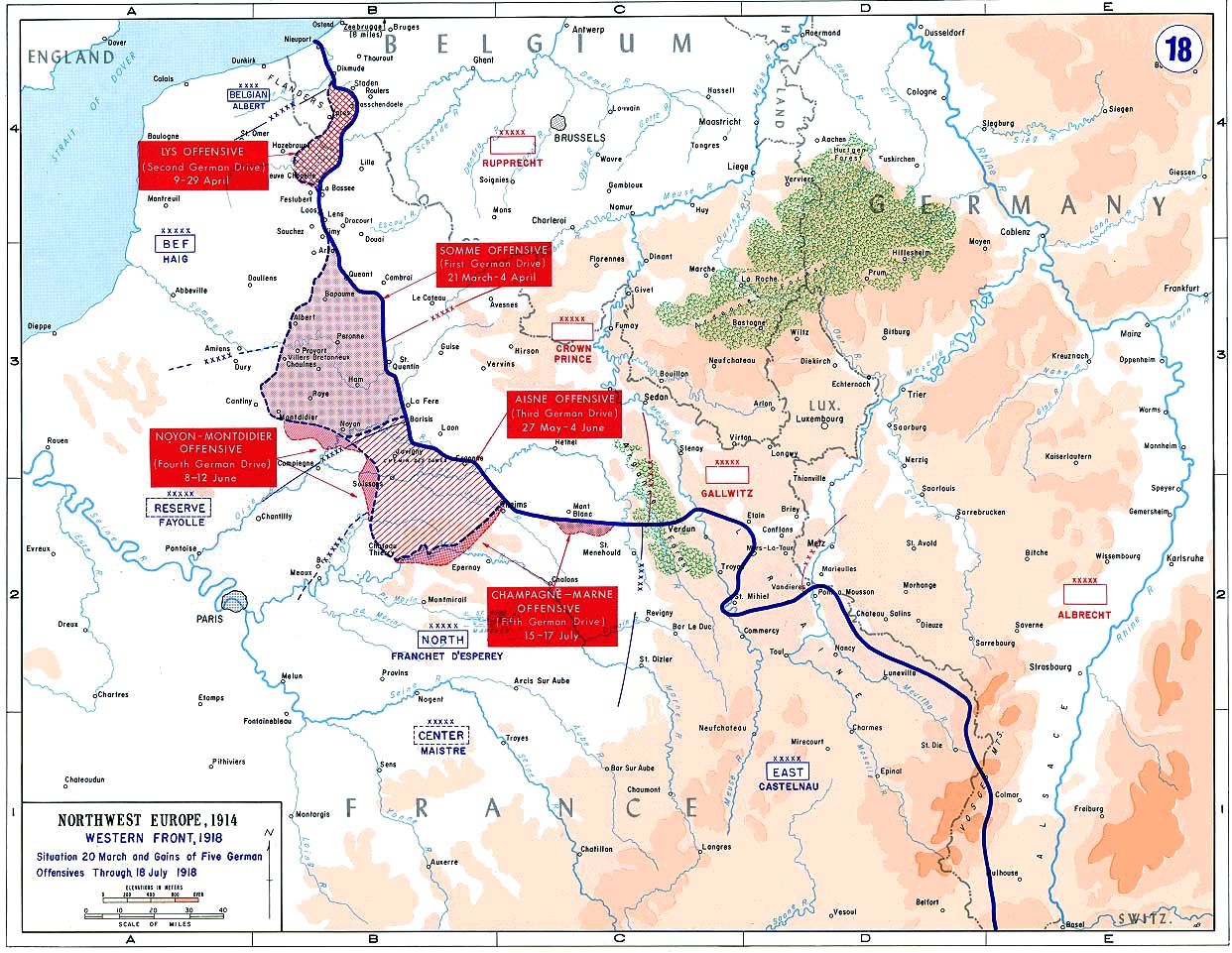
German Western Front 1918
On 21st March 1918 the German forces began a series of offences which were intended to break through Allied lines, outflank the British forces, which held the front from the Somme River to the English Channel, and defeat the British Army. Once that was achieved, it was hoped that the French would seek armistice terms.
However, the quickly advancing German troops could not carry sufficient food and ammunition to sustain themselves and it proved impossible to maintain routes for supplies and reinforcements. As a result the offensives petered out.
The fighting caused heavy German casualties and it was impractical to then hold the ground gained with such depleted forces.
In August the Allies, now bolstered by the arrival of between 1 and 2 million American troops, started a counter offensive which resulted in the Germans loosing all of the ground they had taken. Once they had lost the “Hindenburg Line”, a defensive position built in 1916 from Arras to Laffaux, it was inevitable that the German Empire would capitulate.
Spring Offensive
Read more about the Sping Offensive by following this link to Wikipedia.
Spring OffensiveBert Fardell
Sergeant
London Regiment, Royal Fusilliers
The son of Alice and Walter Fardell of Factory Cottages, Royston was awarded the Military Medal for bravery in action.
His citation reads -
"During the attack by the enemy near Fauntain les Crouiselles on 22nd March 1918, this non-commissioned officer was holding the right flank of his company with his platoon.
"By his coolness and daring, exposing himself to enemy fire, he directed his platoon in such a manner that he repeatedly repulsed the enemy inflicting heavy casualties on them."
Second Battle of the Somme
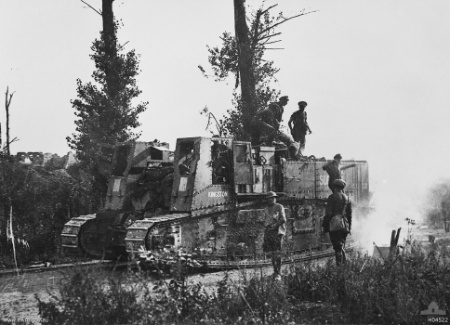
British soldiers revitalising a Gun Carrier Mark 1 tank, named Kingston, at Miraumont on 26th August 1918
The final phase of the Great war began on 8th August with the Battle of Amiens, also known as the “100 Day’s Offensive”.
This pushed the German forces out of France, retreating to behind the Hindenburg Line.
Through October the German armies retreated from all of the territory they had gained in 1914. As the Allies advanced the Germans were forced to abandon more and more heavy equipment and supplies, reducing their moral and capacity to resist.
Second Battle of the Somme
Read more about the Second Battle of the Somme by following this link to Wikipedia.
Second Battle of the SommeErnest Archibald Barron
Riffleman
8th Battalion, City of London Post Office Riffles
Prior to enlistment Ernest worked in the family basket making business in Market Hill, Royston.
In this letter to his parents, Fanny and Alonzo, he tells them on his injuries.
"I am wounded in the back by a machine gun bullet. I have lost the use of the bottom part of my body, but the doctors say I shall get it back in time.
"The doctors and nurses will do all they can for me. They are very kind, and nothing is too much trouble."
Jack Halstead
Gunner
“B” Battery, Royal Field Artillery
Diary entry for 10th November 1918

"Moved on, and were told at midnight we were going on. Tomorrow would commence the 'big push'. We were looking forward to it and that night at 10.00 pm we saw a blaze of lights behind us. Rockets. Phone message came through to return. War had finished. Back we went. That night us gunners never got further than Contrai (Belgium).
"What a night."
Armistice
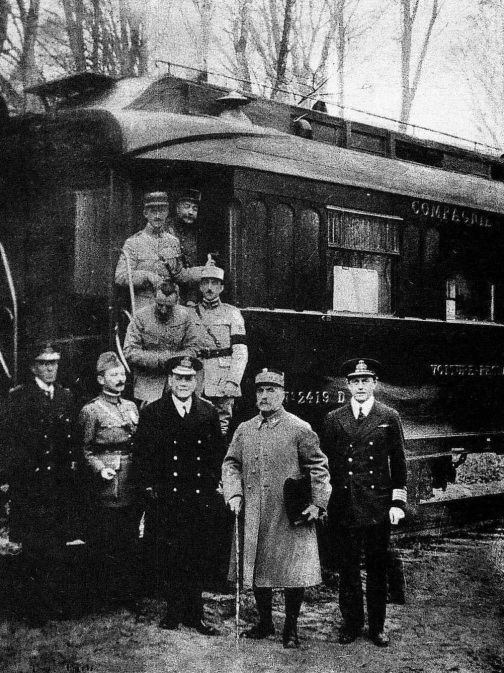
Photograph taken in the forest of Compiégne after reaching the agreement for Armistice
The armistice of 11th November 1918 ended the fighting on land, sea and air. It came into force at 11.00 am, Paris time and marked a complete defeat for Germany, although not formally a surrender.
Although it ended the fighting, it needed to be prolonged three times until the Treaty of Versailles, which was signed on 28th June 1919, took effect on 10th January 1920.
Fighting continued right up to the time that the ceasefire was due to come into effect. 2,738 men dying on the last day of the war. The last man was American Henry Gunther who was killed at 10.59am while charging German troops in an act he probably intended to redeem his reputation following a reduction in his rank.
Armistice
Read more about the Armistice by following this link to Wikipedia.
The Armistice 1918Jack Halstead
Gunner
“B” Battery, Royal Field Artillery
After all that Jack had witnessed and described, his diary entry for 11th November 1918 was very short.

“We washed the guns down.
Football match and more celebrations.”